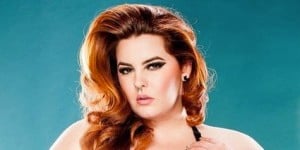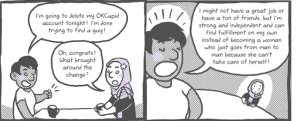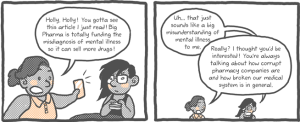
Source: Huffington Post
Originally published on The Militant Baker and cross-posted here with their permission.
Unless you’re someone who refuses to use social media, I’m sure you’re aware that plus-size model Tess Munster/Holliday has rocked people’s worlds by becoming the first model “of her size” signed to an agency.
Her size being five-foot-five and a size 22, which is a far cry from the industry’s standard of having traditionally hourglass-y figures that are a size ten. Plus models never wear above a 16/18 and are usually 5’8″ or taller.
Y’all. Tess is super short and super fat and breaking all the motherfucking rules like the super hero she is.
But changing the status quo is anything but easy.
If I ever want to mourn humanity, all I have to do is scroll through Tess’ Instagram comments. Kids, don’t try this at home. No, really – just trust me on this, and let me tell you what you’ll find so you don’t have to mourn humanity, too.
It’s a rare practice for me nowadays, but when I do take a second to remind myself that this work is important by looking through her account, I find hundreds upon hundreds (collectively, thousands – we might be up to a millions) of comments that either call her barnyard animal names, spout “facts” about how she’ll die early on (because: science), or express their concern about the fact that she’s a negative role model for promoting obesity by loving herself – and these are the kind ones.
The comments on the press as of late has been no exception.
But let’s distract ourselves for a second and recognize that Tess has been covered by so many major publications, it leaves this gal in awe: Time Magazine, People, Cosmo, CNN, Nylon, TMZ, Daily Mail, Life & Style – and dozens of others.
Look at your Facebook sidebar; she’s more than likely trending at this very moment. The fact that this woman’s sexy mug is on every website right now is revolutionary, and I’m enjoying every second of it.
But even the positive press attracts judgmental opinions, and Tess is not the only one who receives a monstrous amount of blatant hate and criticism. I am presented with my fair share of unkind words along with most of the bloggers and advocates I know. And sadly, this is not just limited to just well-known personalities.
The #Fatkini hashtag was attacked not too long ago, and comments were left for every user who posted a picture with the empowering tag.
For years, this vitriol has left me puzzled and asking: Why is this happening? Why is loving yourself so controversial? WHY U SO MAD, WORLD?
Well, I learned why. And it’s because of a thing I like to call Body Currency.
It goes like something this: We are taught as a society that if we achieve the ideal body that we see in traditional media (and not before), we will then obtain love, worthiness, success, and ultimately, happiness. Which is what we all want, right?
Because the vast majority of our culture buys into this, we have millions upon millions of people investing everything they have into achieving this ultimate goal. The goal being thinness, which obviously equals happiness, remember? (Note: Other body “goals” also apply here, like able-bodied, lighter skin color, cisgender appearance, and so on.)
So they spend their lives in a perpetual state of self-loathing (it’s called inspiration!) while working their asses off to become that ideal. We, as Americans, sink billions of dollars into beauty products every year.
Between the millions of us on diets, we gift the weight-loss industry and other weight-loss products over $60 billion dollars as well. Fourteen million of us had cosmetic procedures in 2012 – and yes, that number keeps growing. Perhaps we starve ourselves or maybe we just fixate on our calorie count like it determines our salvation. Maybe we make the gym our god.
Whatever we choose individually, we, as a country, have made “fixing our bodies” our main obsession, and we let it consume our lives. This happens for most of us whether we choose to acknowledge it or not. We live to give the quest towards impossible perfection (marketed as happiness) our all.
So then, after all of this, when a fat chick – who hasn’t done the work, who hasn’t tried to fix her body, who doesn’t have any interest in the gospel we so zealously believe in – stands up and says “I’m happy,” we freak the fuck out.
Because that bitch just broke the rules. She just cut in front of us in line. She just unwittingly ripped us off. And she essentially made our lifetime of work totally meaningless.
It’s kind of like investing everything you own in some sort of stock, and instead of its worth increasing, you’re notified that its value is now the same as Monopoly money. All of a sudden, your investments (aka “Body Currency”) have the devastating value of: zero.
I’ve been there. And I was pissed, too.
The obvious problem with Body Currency is that thinness doesn’t necessarily equal happiness. It just equals money in the pockets of companies who sell us insecurity to make sure that we’re repeat customers.
It’s a real shitty move on their part and leaves anyone who believes in the scam SOL, which then makes them angry without really knowing why. So they direct all their angry feels towards those who cheated the system and found the pot of gold without doing any of the goddamn work.
Tess is the perfect target for this sort of anger and fat hate: she’s successful (Italian Vogue, y’all), she’s in love (he’s darling and has an Australian accent), she publicly shares that she’s worthy, and goddamnit, she’s fucking happy. All while being very much not thin.
THE NERVE! Amiright?
In a killer interview with Yahoo! Health, Virgie Tovar recaps it ever so eloquently (as she often tends to do):
“Fat” is just the current catch-all word for all the things that we as a culture are afraid of: women’s rights, people refusing to acquiesce to cultural pressures of conformity, fear of mortality. [People who hate fat people] see body love as a move toward people taking charge of their lives and choosing what they want to do, no matter what the culture says. This is really scary to a lot of people. The anger they express is actually toward themselves. A person who hates seeing a happy, liberated person wishes they had the strength to do that, but they are too entrenched or “bought in” to the way things are right now to see it as a beautiful thing. So they see it and they hate it. […] People have invested a lot of time and a lot of resources into this game that says “thin wins.” So when people see exceptions to that rule, they feel personally invalidated, personally stolen from, personally affronted.
It falls right in line with a conversation I had with friends where we discussed the difference between reactions that apologetic fatties vs. unapologetic fatties receive.
Gabi Gregg of Gabifresh nailed it by saying:
If there is a fat person on television trying super hard to lose weight, crying about how hard life is, and talking about how they eat to cope, then everyone is at home crying and cheering them on. Put that same person in a crop top while they smile, and the pitchforks come out.
Preach, girl.
If a fat person buys into the same mumbo jumbo as everyone else, we might feel empathy for them. Or maybe we just allow them to exist without acknowledgement. But if they show any glimmer of happiness without following the commandments? Well then, off with their heads – and let’s televise it!
If you haven’t listened to the This American Life episode called “If You Don’t Have Anything Nice to Say, SAY IT IN ALL CAPS,” I’d recommend you do. Within this illuminating episode, Lindy West shares her constant run-ins with Internet hate and recounts an unheard of instance where a particularly vile “troll” e-mailed her with a genuine apology.
It totally happened, so pick your jaw up off the floor already.
Because this girl ain’t got no fear, Lindy called him up to talk about why he hated her so much. After asking him why he chose her of all people to torment, the interview went something like this:
Troll Dude: Well, it revolved around one issue that you wrote about a lot which was your being heavy – the struggles that you had regarding being a woman of size, or whatever the term may be.
Lindy West: You can say fat. That’s what I say.
Troll Dude: Fat. Olay, fat. When you talked about being proud of who you are and where you are and where you’re going, that kind of stoked that anger that I had.
Troll Dude shared that he was done with Internet harassment nowadays, but confessed that during the time that he lashed out at Lindy, he was living what he called a “passionless life” – that he hated his body, had been dumped, and worked at a job he despised. He had the opposite of happiness.
The interesting thing is that since then, he’s started school again, found a girlfriend, started teaching little kids, and found fulfillment. He also no longer tries to inflict pain on others online.
It’s fascinating how this works. It just goes to prove what everyone has known all along: Happy people don’t try to purposefully hurt other people.
I mean, this isn’t a well-kept secret by a long shot. You’d might even go as far as to assume that this is common knowledge (and as indisputable as Ira Glass’s example of the gray boxes in the podcast – omg go listen to the beginning; it’s hilarious), but you’d be surprised at the amount of people who argue this simple concept.
I saw a comment on a Prince Ea video (about haters and their anger) once and made me giggle because it said: “I post a few vulgar comments […] and people auto assume I’m some unhappy asshole in real life. How about people stop being so goddamn sensitive?”
Someone please give this guy a hug.
If we apply this simple concept about happy people to body hate, and we’ll see that people who love their bodies don’t try to purposefully make other people hate their own.
Or as Meghan Tonjes puts it: “People who disrespect the bodies of others really don’t think that much of their own. I promise.”
Unfortunately, with that understood, it’s no wonder we see hostility online.
Why?
Because the greater part of this country (and beyond) spends their time tirelessly attempting to run towards an empty dream. Because Body Currency is a farce.
Because all of those people have learned to hate their current body, and most have no idea that you can think differently.
But the fact of the matter is, you can; body love isn’t just for fat people, it’s for every person imaginable. Everyone has the right to self-love: skinny people. Fat people. Short people. Tall people. All abilities. All sizes. All shapes. All shades. All sexes. All genders. Haters and lovers alike.
After all, we’re all in this bullshit together.
Throughout my “travels” online and IRL, I have yet to meet a woman that doesn’t have something she’d like to change about her body – and men are in a similar boat, except they’re absolutely forbidden to talk about it.
We’ve all been fed the same lies, and while that doesn’t give anyone the right to purposefully hurt others, it does give us a starting point for understanding.
Haters will continue to say whatever they feel about Tess and every other fat person that they consider to be a poor role model. They’ll continue to live unaware of why they’re outraged. But who knows? Maybe some will wisen up.
And though I wouldn’t put money down on the majority (because we’re just not there yet), there are people working on a societal transformation, and we’re making some progress. A super fat chick signing with a London modeling agency? That’s progress, my friends.
For those of you facing any kind of body hate, do me a favor: Ignore those people who tell you that loving yourself is not okay. Feel sorry for the people that hate you for being happy; we all know what that kind of self-loathing feels like.
It’s not required, but if you can, send them body lovin’ vibes because they deserve to love their whole self, too. Keep on rockin’ your version of your bad self.
And in the words of Tess: Don’t forget to “surround yourself with positive, like-minded people who support you. It’s crucial to your happiness and well-being. Never compare yourself to others and celebrate what makes you, you.”
And if you ever find yourself struggling and can’t seem to shake the motherfucking hate (it gets real sometimes), I offer you this “life well-lived” Twitter wisdom from Gabourey Sidibe as inspiration:

Find your own version of a dream job. Find your own version of a private jet. Your body is not a hindrance, and it’s certainly not a barrier to happiness. Only the false belief that you must change yourself in order to be okay is.
You’ve got the power to shake the bullshit. Trust me.
Now go get happy, kick some ass, and live already.
***
To learn more about this topic, check out:
- Fat People Are Not the Problem — Fatphobia Is
- 9 Facts That Disprove The Most Common Stereotypes About Fat People
- Fatphobia: 5 Facts and a Guide for the Disbeliever
- Selfies and Misogyny: The Importance of Selfies as Self-Love
[do_widget id=”text-101″]
Search our 3000+ articles!
Read our articles about:
Our online racial justice training
Used by hundreds of universities, non-profits, and businesses.
Click to learn more




















